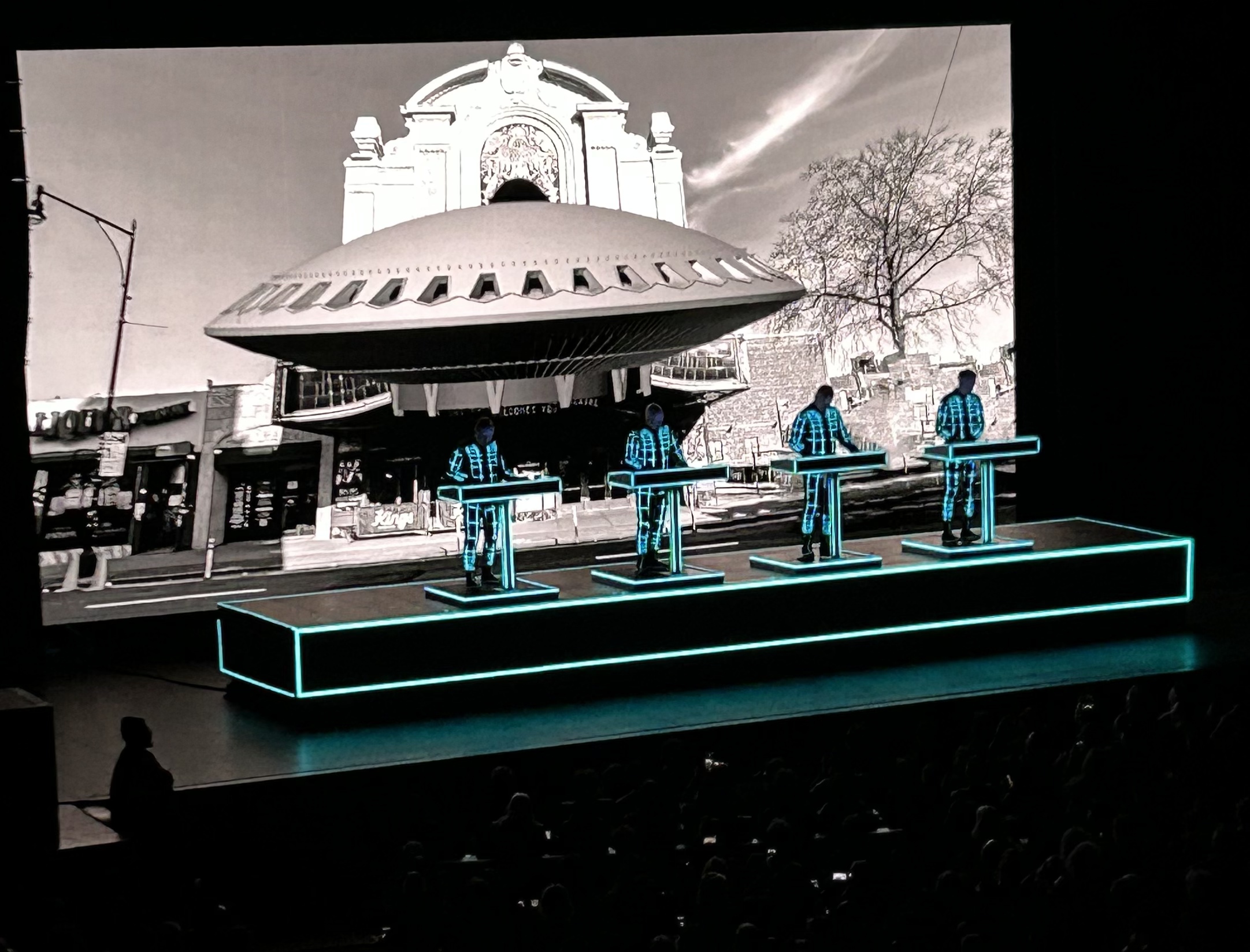Man-machine, computer-love, dance music played to a sold out theater of seated adults, a song called “Musique Non Stop” immediately before the concert stops… Kraftwerk juxtaposes unlikely concepts with infectious rhythm, mesmerizing colors and anachronistic techno-optimism.



German quartet Kraftwerk pioneered electronic music starting in 1970. Their music has inspired nearly everyone making electronica or techno music since, and been sampled in numerous rap songs. Most importantly, they are the inspiration for the nihilist characters in The Big Lebowski and their fictional music group Autobahn, named after the breakthrough 1974 Kraftwerk album. As Maude Lebowski so aptly put it, “their music is sort of an earthy technopop”.
Kraftwerk’s visual performance contrasted minimalism and maximalism. It was impossible to tell whose knob twisting or button pushing created which sound as each man stood nearly motionless behind his respective podium. The only time they showed expression was to take a final bow before trodding off stage, single file of course.
Yet the spectacle riveted the crowd. The musician’s suits lit up like Christmas trees, and a kaleidoscope of neon patterns, soundwaves and images swirled across the giant screen behind them in sync to each song. Sometimes there were computerized videos of the song’s theme, like drifting through space to reach… King’s Theatre in Brooklyn, or cruising along the sunny German Autobahn.


The bass vibrated our seats and the spunky electronic beats rocked heads back and forth, but at the core of most Kraftwerk songs were cheerful and compelling pop melodies sung by a chorus of tinkling synthesizers. Brightness in the music was reflected in enthusiasm about the wonders of technology that permeated every aspect of the show.
The spaceship that brought Kraftwerk to Brooklyn was a time capsule of past futurism. When computers or technology were the focus, they projected images of old desktop computers from the 1980s instead of 2025’s state of the art, a deliberate throwback to an era when personal computing was an exciting new frontier (which much of the audience looked old enough to remember). Monotone robot voices in the songs lacked the human touch of modern voice assistants like Siri or Alexa. The lights of smartphones dotted the audience like confetti, but post-90s innovations were a noticeable absence from the screen. When they did use live-action footage, it was always antiquated and black-and-white.

The lyrics to Kraftwerk songs were often just a few words or phrases representing some concept, with the listener free to fill in the significance based on their own associations. During “The Man-Machine”, the word “machine” scrolled across dozens of rows and columns to fill the entire screen, conveying the relentless presence of machines. In their upbeat and dancy encore “We are the Robots”, technology works purely in service of people: “We are programmed just to do / Anything you want us to”. They also offered glimpses of dependency on machines. “Another lonely night / stare at the TV screen” from “Computer Love” sounds as relevant today as in 1981.

“Radioactivity” was the biggest point of pessimism, as sad robot voices named Tschernobyl, Harrisburg (Three Mile Island), Hiroshima and Sellafield as reminders of technologically achieved tragedy. The concluding message to “Stop Radioactivity,” set to a yellow hazardous waste logo, rang quaint and dated. I bet “Stop Fascism” would have better tapped into this crowd’s zeitgeist.
The choice of languages in Kraftwerk’s lyrics established a Pan-Euro identity: German, English, French, Spanish and occasionally Russian, with Japanese the only exception.
From the iconic expressways in “Autobahn” and “Trans-Europa Express” to the great cycling race in “Tour de France,” they celebrated transportation as Europhenomena. Even regarding the latter race, the lyrics emphasized the technology allowing the world to witness this battle of human strength: “Transmission télévision / Reportage sur moto / Caméra, vidéo et photo” [“TV transmission / reporting on motorbike / camera, video and photo”].


The glowing optimism of Kraftwerk’s songs invited reflection on how our associations with the same concepts have shifted over the decades. While the prospect of personal computers and eventually robots once sparked hope of a more convenient future, today technological progress and artificial intelligence are also entangled with fears over data privacy, political repression and corporate dominance.
That said, Kraftwerk’s dazzling audiovisual performance sparked joy during a time of global pessimism. By the end of the show, half the audience had put their handheld computers away and gotten up to dance.

